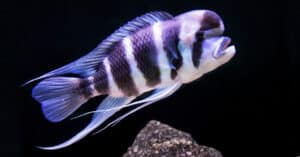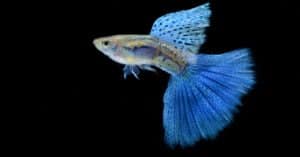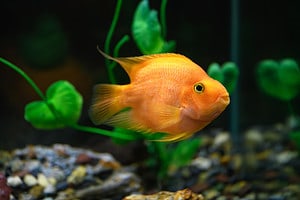Betta fish are also known as Japanese fighting fish. In Japan, betta fishes are noted for being territorial and fighting if two are placed together or see each other’s reflections. Bettas are native to Thailand, Vietnam, and Cambodia. In the wild, they inhabit rice paddies, floodplains, and canals. Bettas are beloved pets, but you might be curious what betta fish eat. We’ll dig into what betta fish eat, how much you should feed them, and much more below!
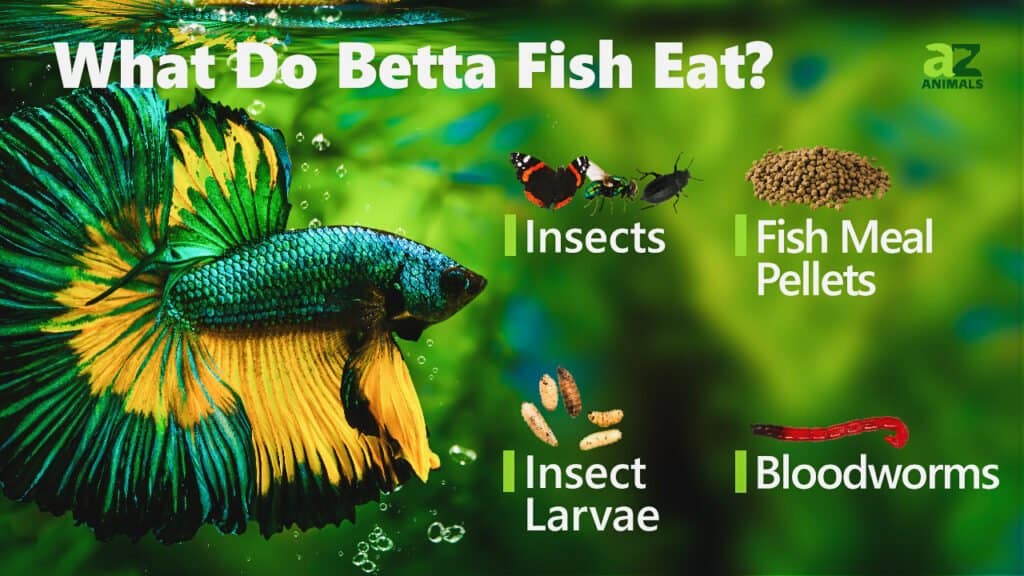
What Should I Feed My Betta Fish?
Good nutrition is important for betta fish’s health. Despite what some fish dealers say, betta fish cannot live on plant-based foods and does not eat root systems. Insects and larvae are the main diet of betta fish in the wild. Overfed bettas, like overweight cats and dogs, can develop health problems.
There are three main types of food pet Bettas eat:
Betta fish eat three main types of food that are dried, flakes, and pellets. Understanding which types of food your betta prefers could help increase their longevity:
Dried
A lot of betta fish like to eat freeze-dried food. Bloodworms, which Bettas eat in the wild, are one example. It’s best to use this meal as a treat or snack for Betta Fish because they’re so fond of it!
Flakes
Bettas aren’t always a fan of flakes. Betta fish need flakes produced just for them! Supplementing this meal with additional betta food is common to give your pet the nutrition he or she needs.
Pellets
Pellets are a favorite food for betta fish. Bettas can be fed pellets as a mainstay of their diet. Betta fish-specific pellets are required! Keep in mind, the pellets will sink, so be sure you just feed the fish only what they need.
Every betta is different, and some can be pickier than others. Trying each food type out and seeing what your betta prefers is key to its overall health and longevity.
How Often Should I Feed My Betta Fish?
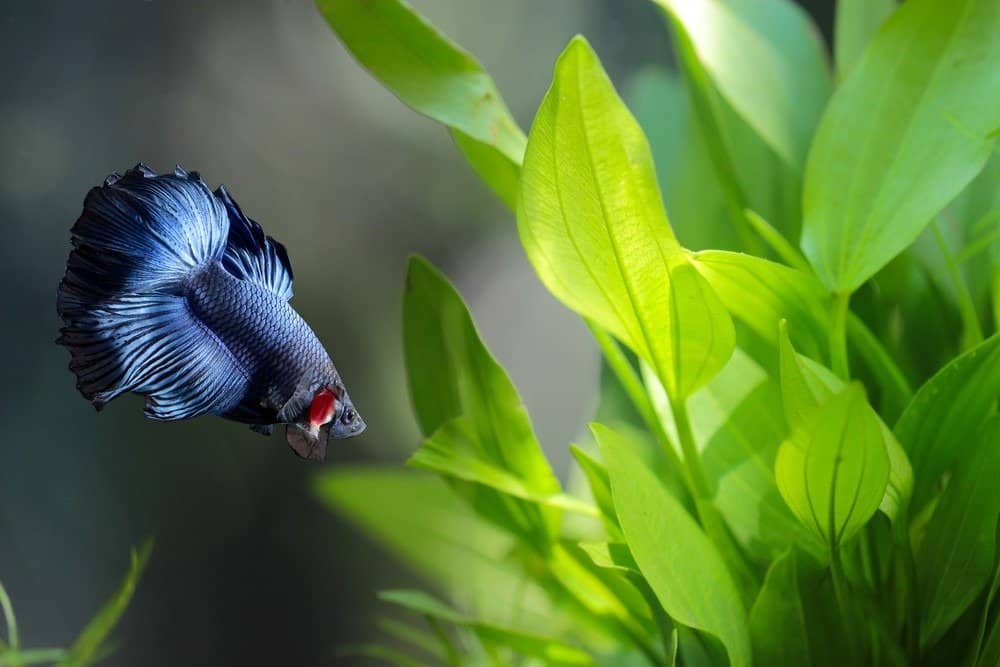
Overfeeding betta fish can lead to food decomposing that produces toxins
©Napat/Shutterstock.com
It is usually advised to give your betta fish two to four pellets, one to two times a day, depending on their size. When placed in water, pellets expand and become extremely full for your betta fish, which is why they are so popular. If you are using flakes, take a tiny pinch of food in the morning and evening. One to two days a week, freeze-dried or fresh food can be used in place of pellets.
The key is to not overfeed them. Extra food will decompose and produce toxins if left in the tank. Overeating might also cause disease in your fish. To check to see if your fish is gaining weight, look for a bulge in the belly area!
Can Betta Fish Eat Fruits Or Vegetables?
Betta Fish typically shouldn’t be fed fruits and vegetables since their diet must be 75-90 percent protein. High-protein freeze-dried, and frozen meals can be provided to your betta fish as special treats, but the bulk of their diet should consist of pellets or flakes made specifically for betta nutrition.
Do Betta Fish Eat Other Fish or Live Food?
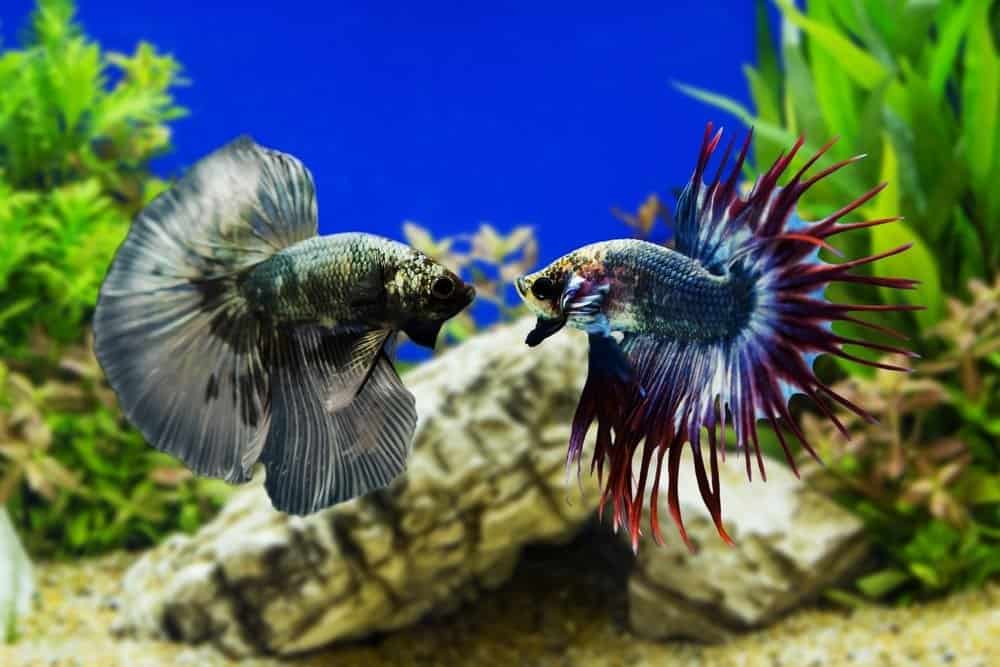
Betta fish will consume other small fish and aren’t ideal for larger tanks
©subin pumsom/Shutterstock.com
Yes, betta fish can consume and digest other fish. Therefore, a community aquarium is not usually the greatest place for betta. The betta has been known to feed on small fishes like tetras, danios, gourami, killifish, etc. So never put a Betta Fish in a tank full of tiny fish!
Male bettas attack and kill other male bettas to establish a territory with food, shelter, and female access. Female bettas are known to get along nicely with other female bettas since they are less territorial than males. Making sure the tank is big enough for two females and monitoring their behavior is critical. Keep males and females apart unless they are mating and being closely observed. Bettas are less territorial in bigger natural habitats and would spar rather than fight to the death.
Feeding live items to betta fish can result in the healthiest fish. Popular are brine shrimp and mosquito larvae. It is possible that parasites will be introduced into your aquarium by feeding your betta fish this meal. As a result, you should never give your betta fish anything you found outside. Always buy live food or its freeze-dried equivalent from a pet store.
Do Betta Fish Get Lonely?
Betta fish are unlikely to be lonely in their tank because of their independent and territorial nature. They can, however, become bored if they are housed in too small an environment. Often, betta fishes are found in bowls that are too tiny to allow them to engage in regular swimming and hiding habits. For this reason, they should be kept in a 5-gallon-or-larger tank. Toxic accumulation in the environment is reduced when the betta fish live in a habitat of this size.
Unlike other popular pet fish, bettas have excellent memories and may recall humans even if they haven’t seen them in weeks. This memory helps them form long-lasting bonds with their owners. So, the more you interact with your Betta Fish, the stronger the attachment will be.
How to Make My Betta Fish Happy
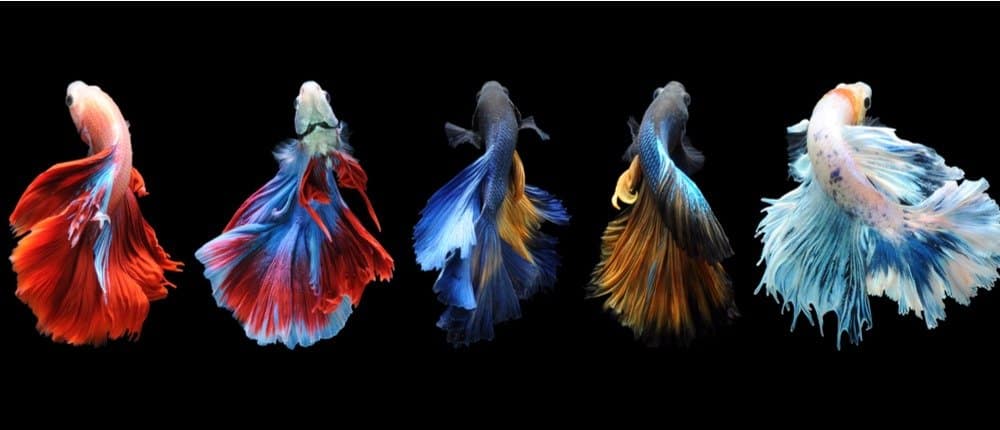
Bettas come in a variety of beautiful colors – make sure their diet is 75% to 90% protein to keep their health up
©Arif Supriyadi/Shutterstock.com
A happy, healthy betta will exhibit vibrant colors, open fins with smooth, active swimming, and will feed easily. A stressed betta will show dull colors, clenched fins, poor appetite, lots of hiding, and lethargy. Responding quickly to physical and behavioral changes shows that your betta’s health is a priority.
Aside from a balanced and healthy diet, other essential factors for betta happiness include:
Spacious and Stimulating Habitat
As labyrinth fish, betta fish may breathe directly from the water surface. As a result, a widespread misunderstanding is that betta fish may be happy in a cup or small bowl. However, for betta fish to truly thrive, they should be kept in a minimum five-gallon aquarium. Keep it between 75-80 degrees Fahrenheit. Colder water weakens the immune system of bettas, making them more prone to sickness. A tank heater should keep the temperature up.
Betta fish need a tank with a filter to protect your fish from bacteria and toxins. To avoid exposure to heavy metals and chlorine, the water should be dechlorinated with water conditioners. A pH of 6.5-8.0 is ideal. Changing the water at least one time a week is recommended. Be sure to provide them with various hiding places and toys, such as floating mirrors and betta hammocks.
Bonding Time
Follow the finger is a fun game to try to bond with your betta. Place your finger on your betta’s tank and wait for him to swim towards it. Watch your betta follow your finger around the tank as you move it. Each time your betta follows your finger, give him a small treat. Just make sure not to overfeed!
Anyone who has a betta can tell you these fish are clever and have feelings. Betta fish are intelligent enough to recognize and respond to their owners. If you take the time to build a positive relationship with them, they will reciprocate and show interest and affinity toward their owner.
The photo featured at the top of this post is © panpilai paipa/Shutterstock.com
Thank you for reading! Have some feedback for us? Contact the AZ Animals editorial team.



